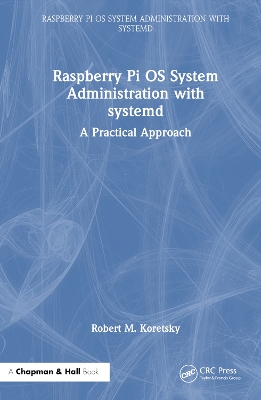Raspberry Pi OS System Administration with systemd
3 total works
The first in a new series exploring the basics of Raspberry Pi Operating System (OS) administration, this volume is a compendium of easy-to-use and essential system administration for the novice user of the Raspberry Pi OS.
The overriding idea behind the system administration of a modern, 21st-century Linux system such as the Raspberry Pi OS is the use of systemd to ensure that the Linux kernel works efficiently and effectively to provide the three foundation stones of computer operation and management: computer system concurrency, virtualization, and secure persistence. Exercises are included throughout to reinforce the readers’ learning goals with solutions and example code provided on the accompanying GitHub site.
This book is aimed at students and practitioners looking to maximize their use of the Raspberry Pi OS. With plenty of practical examples, projects, and exercises, this volume can also be adopted in a more formal learning environment to supplement and extend the basic knowledge of a Linux operating system.
The third volume in a new series exploring the basics of Raspberry Pi Operating System administration, this installment builds on the insights from Volumes 1 and 2 to provide a compendium of easy-to-use and essential guidance for Raspberry Pi system administration for novice users, with specific focus on Text Editors, git/ GitHub, and LXC/LXD.
The overriding idea behind system administration of a modern, 21st-century Linux system, such as the Raspberry Pi OS, is the use of systemd to ensure that the Linux kernel works efficiently and effectively to provide these three foundation stones of computer operation and management: computer system concurrency, virtualization, and secure persistence. This third volume includes a beginner’s compendium of essential text-based Linux commands, a complete tutorial on the most important Raspberry Pi OS Text Editors, a description of uses of the git command, and a thorough explication of container virtualization with LXC/LXD and Docker.
This book is aimed at students and practitioners looking to maximize their use of the Raspberry Pi OS. With plenty of practical examples, projects, and exercises, this volume can also be adopted in a more formal learning environment to supplement and extend the basic knowledge of a Linux operating system.
The fourth volume in a new series exploring the basics of Raspberry Pi Operating System administration, this installment builds on the insights provided in Volumes 1, 2, and 3 to provide a compendium of easy-to-use and essential Raspberry Pi OS administration for the novice user, with specific focus on ancillary topics that can be used with the Raspberry Pi OS based upon upstream Debian Bookworm release, and the Raspberry Pi 5.
The overriding idea behind system administration of a modern, 21st-century Linux system such as the Raspberry Pi OS is the use of systemd to ensure that the Linux kernel works efficiently and effectively to provide these three foundation stones of computer operation and management: computer system concurrency, virtualization, and secure persistence. This fourth volume includes full-chapter explications, with many examples, of the following:
- the Zettabyte File System (ZFS)
- the X Window System, the Wayland protocol, XWayland, the Wayfire window manager, XCB, Qt5, and GTK4 graphics
- the Emacs text editor, and
- a basic introduction to important Raspberry Pi commands for the novice user
This book is aimed at students and practitioners looking to maximize their use of the Raspberry Pi OS. With plenty of practical examples, projects, and exercises, this volume can also be adopted in a more formal learning environment to supplement and extend the basic knowledge of a Linux operating system.


